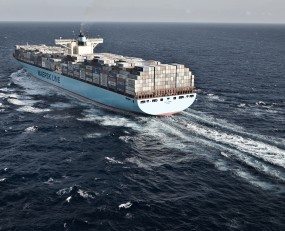
Maersk continued to make money in a falling market according to its financial results for the quarter ending September 30, 2020.
“One thing we’ve learned is that it doesn’t really matter if a society is in lockdown or not, because consumers spend their money online instead of going to the mall…..a lot of the money consumers haven’t been able to spend on holidays or at restaurants, bars or sporting events, have instead been buying things like flat-screen TVs or new shoes,”. Maersk’s CEO Soren Skou’s comments during the Q3 results presentation on Wednesday (November 19) are not the whole reason why Maersk and much of the rest of the container shipping sector have remained profitable, however, it is an important aspect of it.
That said, the Q3 results from the Copenhagen based shipping line still saw volumes of containers handled fall 3.6% in Q3-20 as compared to Q3-19. Yet this demand picture was not balanced, with East-West trades falling just 0.5% but North-South trades down by 9.6%. This was compensated for by a 4.4% rise in freight-rates where East-West trades saw a 14.3% year-on-year jump in the quarter.
As has become usual with Maersk, the cost base fell, down by 13%, led by lower bunker fuel costs but complemented by a 96% utilisation rate. Unsurprisingly, all this pushed the ‘Ocean’ business into a rise in Earnings Before Interest Depreciation and Amortisation (EBITDA) of 39% at $1.8bn despite revenue decreasing by 4.1%.
It was this performance by this core shipping business that drove profits at Maersk, however, other divisions of Maersk also did surprisingly well. Logistics and Services delivered a 44% increase in EBITDA on a revenue increase of 11%, something Maersk ascribes to “intermodal, air freight forwarding and warehousing and distribution”. That said, there was a $40m restructuring cost due to the closing of Damco. The terminals business saw a more modest increase, with EBITDA up 4.1%.
Overall, this was a continuing affirmation of the Maersk strategy with EBITDA for the whole company up 39% year-on-year for the third quarter at $2.3bn despite a 1.4% fall in revenue. The company improved its forecast of EBITDA for the full year by $500m, to between $8bn and $8.5bn. If there is a strong recovery in the early part of 2021 profitability may increase even more strongly.
Source: Transport Intelligence, November 19, 2020.
Author: Thomas Cullen